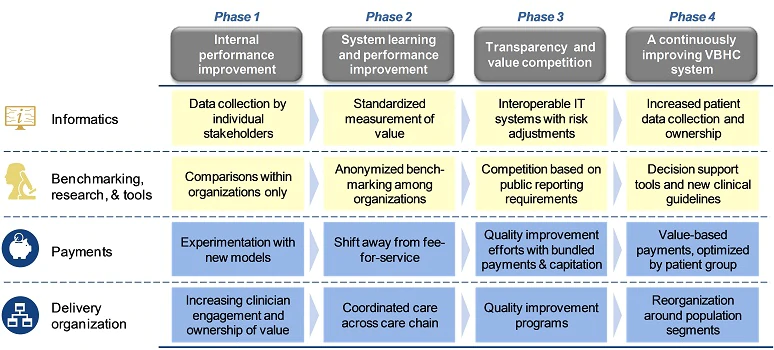New Report Issues Call to Action Toward Value-Based Healthcare
Global healthcare industry leaders share framework for system-level care models that give stakeholders the authority, tools and accountability to achieve the best value for patients.
In order to deliver substantially better patient health outcomes at lower cost, the world’s healthcare systems require new and comprehensive care models that focus on value.
That is the recommendation put forth in a new report issued by the Value in Healthcare Project, an initiative organized by the World Economic Forum and the Boston Consulting Group. The project’s members include the heads of major healthcare providers, medical technology and pharmaceutical companies, public payers and government ministries. Medtronic chairman and CEO Omar Ishrak sits on the project’s Executive Board.
The report, titled Value in Healthcare: Laying the Foundation for Health-System Transformation, marks the first time that such a diverse group of leaders have embraced a clear country-level approach to healthcare reform.
“Current traditional care models incentivize volume. At the heart of value-based healthcare is a shift to put the patient back at the center of care – what’s best for the patient should drive the system, rather than the volume of procedures,” said Ishrak. “By shifting the focus to outcomes, we can improve the health of patients and also contain costs for the system. The medical technology industry plays a leading role in driving value creation. New innovation will be required to ensure continual improvement in outcomes and reduction in cost rather than one-time savings.”
Laying a Foundation for Advancement
Although the concept of value-based healthcare has been around for some time, the Value in Healthcare report offers the most complete description of what a comprehensive national model should include, along with the complex stakeholder alignments that would be necessary for success.
At its core, value-based healthcare emphasizes the central importance of the systematic and transparent tracking of health outcomes in order to remove unwanted variation in healthcare quality, while also reducing costs. The report outlines the basic foundational principles for what value truly means in healthcare while providing a preliminary roadmap for system transformation. Some leading providers in countries around the world are already taking this approach, but the true potential for value-based care delivery will only be realized when the model is applied at the regional, national and international levels. The report examines key enablers in this transformation, including informatics (data tracking and analysis), benchmarking, payment factors, and delivery organization. It also includes an examination of the roles of public policy and patient empowerment in national value-based healthcare systems
Work in Progress
To put its recommendations into practice, the Value in Healthcare project has already begun working on a pilot program in the state of Georgia to create a comprehensive value-based approach to heart failure in the Atlanta metropolitan area. Twenty organizations, including payer, provider, supplier, and government organizations, are involved in the pilot, which is one of four regional pilots that the project will be conducting worldwide this year.
A copy of the Value in Healthcare: Laying the Foundation for Health-System Transformation report can be downloaded here.

